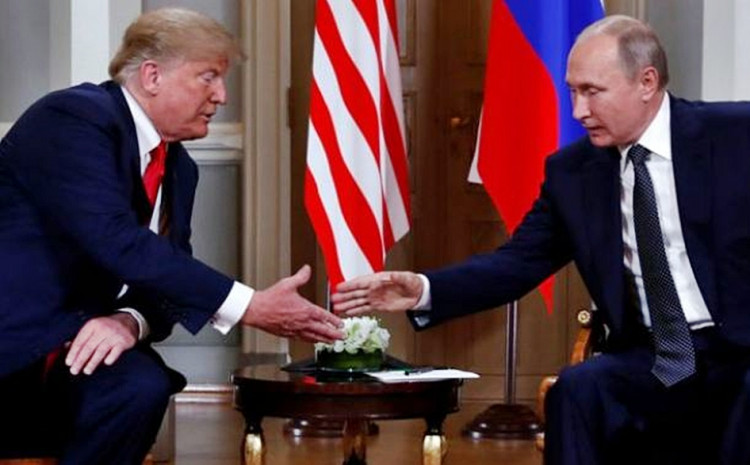Former President Donald Trump has reportedly maintained contact with Russian President Vladimir Putin several times since leaving the White House in 2021, according to Bob Woodward's upcoming book, "War." The revelations have sparked fresh concerns about Trump's ties with Putin, especially as he positions himself for a potential return to the Oval Office in the 2024 election. The book, set for release on October 15, details claims that Trump has had as many as seven phone calls with the Russian leader during a period that includes Russia's 2022 invasion of Ukraine.
Woodward's book suggests that these interactions raise serious questions about Trump's relationship with Putin, a leader who has been widely viewed as an adversary of the United States. One striking episode recounted in "War" involves Trump asking a senior aide to leave the room at his Mar-a-Lago residence so he could have a private conversation with Putin. "According to Trump's aide, there have been multiple phone calls between Trump and Putin, maybe as many as seven in the period since Trump left the White House in 2021," Woodward writes.
The claims have been met with staunch denials from Trump's camp. Steven Cheung, Trump's communications director, dismissed the allegations as "made-up stories" and labeled Woodward as a "demented and deranged man." Cheung further insisted that Trump provided no access to Woodward for his book, calling the entire narrative a fabrication designed to attack Trump's credibility as he campaigns for the 2024 Republican nomination.
These revelations have reignited scrutiny over Trump's affinity for authoritarian leaders, a topic that has long fueled criticism from his opponents. Former Australian Prime Minister Malcolm Turnbull once described Trump's behavior around Putin as "creepy," likening the dynamic to a schoolboy admiring the captain of the football team. Meanwhile, Trump's niece, Mary Trump, suggested that her uncle's gravitation toward figures like Putin stems from his upbringing in a strict, authoritarian household.
The timing of these reports is critical, coming just a month before Trump faces off against Kamala Harris, the Democratic presidential nominee, in the 2024 election. Harris reacted to Woodward's claims during an appearance on The Howard Stern Show, criticizing Trump for allegedly sending COVID-19 testing kits to Putin when such supplies were scarce. "That is just the most recent stark example of who Donald Trump is," Harris said, condemning the alleged gesture to an adversary of the United States.
Woodward's book also sheds light on Trump's actions during his time in office, including a previously undisclosed incident where Trump secretly sent Putin COVID-19 testing machines at the height of the pandemic. According to the book, Putin, who was concerned about infection, requested the tests, to which Trump responded, "Please don't tell anybody you sent these to me," to which Trump allegedly replied, "I don't care, fine."
These details have provoked sharp criticism from experts in national security and intelligence. Rolf Mowatt-Larssen, a former top CIA official, called Trump's continued interactions with Putin "totally inappropriate," especially given Russia's ongoing conflict with Ukraine, a key U.S. ally. "Even if it's just a social call, it undermines U.S. policy by talking to a leader of a country that is at war with an ally that we are supporting militarily and financially," Mowatt-Larssen said.
John Bolton, Trump's former national security advisor and now a vocal critic, expressed skepticism about the nature of Trump's calls with Putin, quipping, "I'm sure they weren't exchanging dinner recipes." This sentiment was echoed by other analysts who questioned the strategic implications of Trump's continued dialogue with a leader actively engaged in a conflict against U.S. interests.
The revelations in Woodward's book come as Trump faces mounting pressure over his ambiguous stance on the Russia-Ukraine war. Although Trump has repeatedly claimed he could end the conflict within 24 hours if re-elected, he has not provided any specific plans on how he would achieve this resolution. Meanwhile, the Biden administration has continued its robust support for Ukraine, both financially and militarily, while simultaneously criticizing Russia's aggression.
In another twist, Woodward's book also delves into President Biden's views on Putin and his deep concerns over the Russian leader's potential use of nuclear weapons in Ukraine. According to the book, Biden was candid with his advisers, referring to Putin as "evil" and expressing his frustration over the situation in Ukraine. The book quotes Biden as saying, "Putin is evil. We are dealing with the epitome of evil," reflecting the administration's hardline stance against Moscow.






